If you want to sharpen your critical thinking skills then a MasterClass from the world’s most famous astrophysicist could be just what you’re looking for.
The Neil deGrasse Tyson MasterClass aims to help you view the world through the lens of basic scientific principles. So that you can sift information, navigate bias and communicate your ideas more effectively.
In his 30+ year plus career, Neil deGrasse Tyson has been awarded 21 honorary doctorates, received the Stephen Hawking Medal for Science Communication and made so many media appearances he is the most recognizable astrophysicist in the world.
But along with global acclaim, Tyson has his critics. And for all its merits, his MasterClass also has its faults.
So, is the Neil deGrasse Tyson MasterClass right for you? What can you expect to gain from it? Is it actually worth your time and effort?
These are some of the questions I’ll be answering in this Neil deGrasse Tyson MasterClass review.
But first, if you’re pushed for time, here’s the headlines:
.
Quick Summary
Learn how to:
- Understand basic scientific principles
- Approach problems like a scientist
- Rewire your brain to ask the right questions
- Become sensitive to issues of bias
- Use a range of effective communication tactics
- Present and argue a case effectively
Pros:
- Teaching in scientific basics from a world renowned astrophysicist and educator
- Great selection of supporting scientific examples, clearly explained
- Actionable tips for better communication strategies from a renowned public speaker
- Helpful workbook with glossary of terms
- Cinematic production values
Cons:
- More theoretical than practical
- Not suitable for anyone with more than an intermediate understanding of science
- Little in the way of further learning activities in the workbook
Course length: 13 video lessons totalling 2 hours and 14 minutes
Best for: those wanting an introduction to scientific thinking from one of the world’s most accomplished scientific communicators. Also, anyone who’s intellectually curious, seeking to sharpen their critical thinking skills or wanting to communicate more effectively.
Less suitable for those who already have academic training in the sciences, or social sciences. That said, there is still much to be gained in terms of presenting complex ideas.
Overall: Tyson distils the wisdom gained from thirty years of being an advocate for science to give you the tools you need to train your mind to think more skeptically and sort fact from fiction. He also shares his personal approach to communicating with any audience, a skill which has made him the world’s most recognizable astrophysicist. While it’s not without its flaws, I gained a lot from this MasterClass and had a lot of fun along the way!
Now for my more detailed review, here’s what I’ll be covering:
- A look inside the Neil deGrasse Tyson MasterClass
- Pros and cons of the course
- Is the content unique?
- Is there anything better?
- Verdict: Is the Neil deGrasse Tyson worth it?
First the basics:
About Neil deGrasse Tyson
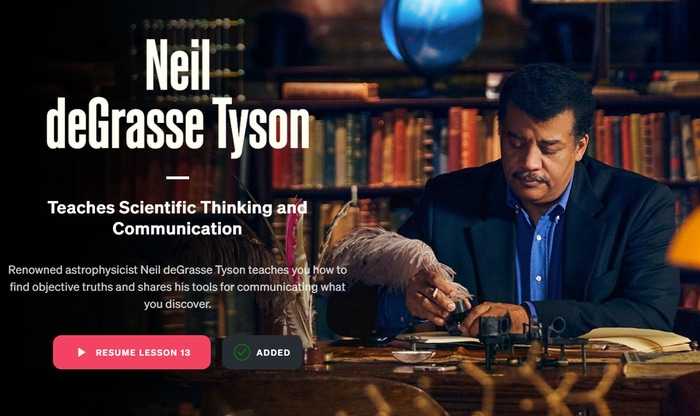
Neil deGrasse Tyson is director of the Hayden Planetarium at the Rose Center for Earth and Space, a renowned astrophysicist, planetary scientist and, above all, science communicator.
His mission is to make science accessible and exciting and his ability to connect to any audience has caught the attention of people all over the world.
Tyson’s best selling books, television shows, podcasts and massive social media presence are all testimony to his success.
As are the numerous awards he has received in recognition of his ability to excite the public about the wonders of science.
Among them the NASA Distinguished Public Service Medal, the Stephen Hawking Medal for Science Communication and having an asteroid named after him in honor of his contributions to public understanding of the cosmos.
In this MasterClass, Tyson distils the wisdom gained from thirty years of being an advocate for science to give you the tools you need to train your mind to think differently.
And if you haven’t already watched it, I recommend you watch the Neil deGrasse Tyson MasterClass trailer.
About MasterClass
MasterClass is one of the most popular online learning platforms there is.
Two things separate it from its competitors:
- Its instructors have achieved global celebrity status due to their accomplishments in their fields of expertise, and
- Cinematic quality production values
The MasterClass philosophy is simple: we all deserve access to genius and the right to learn from the very best.
Neil deGrasse Tyson’s MasterClass sits beside courses from other world renowned experts such as Chris Hadfield, Gordon Ramsay, Brandon McMillan, Hans Zimmer, Paul Krugman, Jane Goodall, and Martin Scorsese.
If you want more details on MasterClass and some of its most popular classes, check out our Masterclass review and best MasterClass article.
Inside the Neil deGrasse Tyson MasterClass
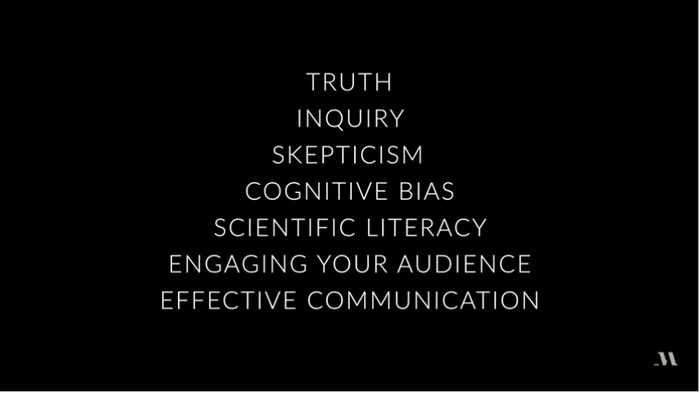
Neil deGrasse Tyson’s MasterClass comes in at 2 hours and 14 minutes of viewing time. It consists of:
- 13 lessons which are mostly between 7-15 minutes long
- Access to an online community of fellow students.
- A 24 page workbook containing a short biography of Neil deGrasse Tyson, a summary of the MasterClass and a glossary of terms to help you keep track of all of the concepts that are introduced in the class.
I’ve divided Neil’s MasterClass into six main sections:
- Meet your instructor
- Scientific thinking
- Obstacles to scientific thinking
- Scientific measurement
- Communicating science
- The future of our world
To give you an idea of what to expect, I’ve summarized each of these sections below:
Section 1/6: Meet your instructor
What you know is not as important as how you think

“I can guarantee you, that the most important moments of your life are decided not by what you know, but how you think”
Against a spectacular backdrop of images from space, Neil deGrasse Tyson introduces himself and the cosmic perspective that informs everything he says and does.
He describes the impact scientific thinking can have on every aspect of your life, and what he wants you to learn from this MasterClass.
Which is how to:
- Be restless in your quest for the truth
- Rewire your brain to ask the right questions
- Communicate what you learn effectively
- Retain a sense of awe and wonder about the world you live in
The goal here is to train your mind how to see the world differently
Section 2/6: Scientific thinking
The frontier of science
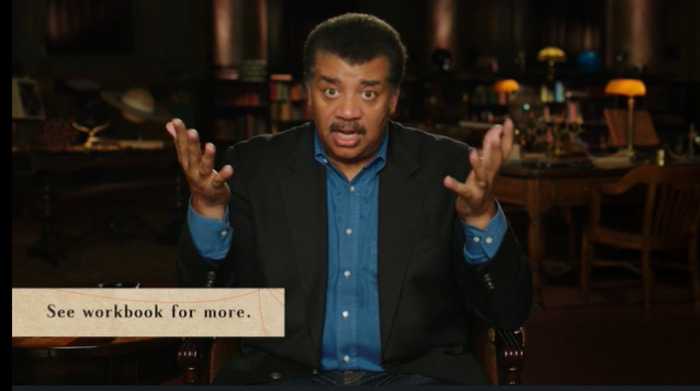
“I get asked this all the time: what’s the one question you want answered before you die? You know what that question is? It’s ___”
Uh, uhh! No spoilers!
Here, Tyson describes the thrilling, but frightening, experience of standing on the shifting frontier between the known and the unknown.
And he outlines some key definitions for terms you’re going to hear throughout this MasterClass. These include:
- What he refers to as ‘badass’ science
- Hypotheses and theories – and the difference between them
- And a down to earth definition of the scientific method
The scientific method
Tyson furthers our understanding of the scientific method by providing three of his favourite examples of its use.
Each one with wildly differing outcomes.
His every day, narrative style help us see how scientists have taken what’s already known to:
- Frame new questions
- Make predictions
- And come to three very different and surprising conclusions – one of which, turned out to be plain wrong

I loved that Tyson took time to show how science can take a wrong turn. And how and why that happened.
He asks for our sympathy for scientists at the frontier and I admired this humility which made him seem even more approachable.
I particularly liked the reference to the workbook which contained a glossary of terms. I’ve reviewed a number of MasterClasses that don’t have this feature and was relieved to see it in place for this class – not being a scientist myself!
It was also really helpful to my understanding that the examples Tyson used were supported by animations.
Section 3/6: Obstacles to scientific thinking
Be a skeptic
This section starts out with Tyson explaining what informed skepticism is, what it isn’t and how to practice it so we can:
- Ask the right questions
- Avoid being manipulated
- Recognize when valid evidence is being presented
Then he moves on to tackle aspects of being human that can get in the way of our ability to recognize the truth. Our biases.
Cognitive bias, cultural bias and our systems of beliefs
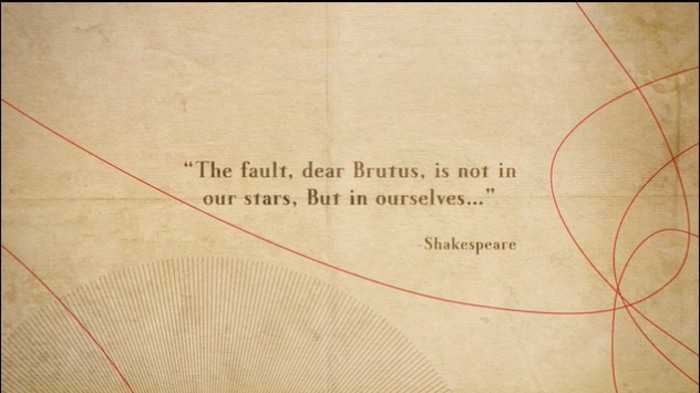
Susceptibility to bias is simply part of the human condition.
In these three lessons, Tyson discusses different biases that can obstruct our search for truth. These include:
- The need to feel special
- The urge to see patterns
- Not being wired to think about probability
- The influence of culture on beliefs and assumptions
- Personal, religious and political beliefs
As always, Tyson provides examples of how these biases can, and have, interfered with critical thinking. And how they prevent you from seeing the objective reality that conflicts with them.

He ends this section by urging us to be constantly alert to our biases and willing to let go of cherished thoughts and ideas in the face of the evidence.
“The better connected you are to what’s objectively true the more likely you will be able to make decisions that benefit you and those you care for.”
Section 4/6: Scientific measurement: calculating the incalculable

Here, Tyson discusses his favorite subject. Measurement.
Using everyday examples, he helps us understand that:
- All measurements are an approximation
- The differences between precision and accuracy in science
And you’ll learn how, since 1972, a second hasn’t lasted exactly a second. A fact we know only due to scientific measurement.
Section 5/6: Communicating Science

“It’s not good enough to be right, you also have to be effective”
It’s not enough to be right
In this section, Tyson drives home the necessity to act on, and communicate, the truth. He sees it as an active duty.
It’s not easy.
Especially now when opinions are so polarized. But here he shares some of the tools he uses as a public educator to communicate effectively.
Preparing for your audience
“You have to understand your audience…otherwise you’ll be lecturing and not communicating.”
For Tyson, the starting point for effective communication is to spend quality time researching your audience. You need to know as much as you possibly can about their:
- Demographics
- Likely belief systems and political leanings
- Current levels of understanding
- Propensity to humor
- Probable attention spans
To help you customize what you have to say, pitch it to the right level, use appropriate language and just make it easier for them to understand your message.
He shares a wealth of actionable tips for preparing to work with a range of audiences from children, through ‘hipsters’ to seniors.
And he provides an entertaining example of how comparison and humor can be used to deflate opposition – providing you know your audience and have done your research!
Communication tactics and inspiring curiosity
In this lesson Tyson shares “items from his utility belt” that he uses to connect with his audience. They include:
- How and why to use humour
- Using relatable examples and analogies
- Creating and using soundbites
- Deploying non-verbal communication cues
- Stimulating curiosity
- Differentiating levels of detail depending on audience and context
- And how to leave your audience thinking, and craving for more
He also provides advice for reflecting on your delivery to assess how you can become even more effective next time.
These are practical skills, backed by real life examples, that you can easily use in your work and personal life to get your message across. Both more productively and more completely.
Section 6/6: The future of of our world
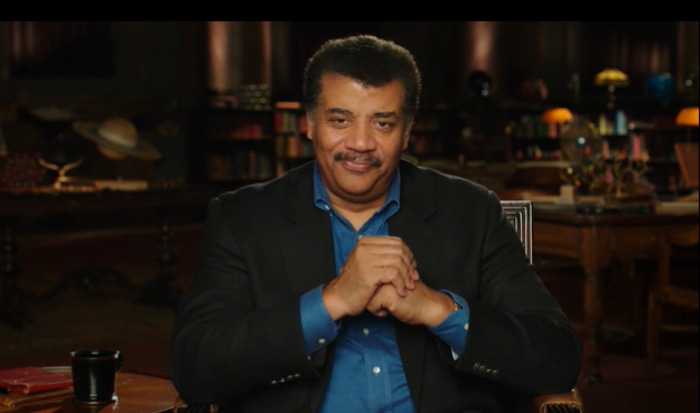
“I’ve been delighted to share with you what makes me tick. In the hope that, right now, it also makes you tick.”
As he bids farewell, Tyson explains why he believes society simply can’t progress without scientific thinking and effective communication.
He thanks you for joining him and urges you to see what he’s shared, as just the beginning of your quest for truth and to “go forth… as a shepherd of civilization.”
What I Liked About the Neil deGrasse Tyson MasterClass
Teaching in scientific basics from a world renowned astrophysicist and educator
As an expert on all things astrophysical, from exploding stars to the structure of the Milky Way, Tyson is more than qualified to give a MasterClass on scientific basics.
Moreover, his lifelong commitment to making science accessible to the public means he delivers the class using humor, analogy and relatable examples. All great teaching techniques that made the class an enjoyable learning experience for me.
Actionable tips for better communication strategies from a renowned public speaker
Tyson’s ability to communicate complex ideas is what has given him such reach, with literally tens of millions of followers on social media.
So it’s great he shares some of his techniques and tips in this MasterClass. These tactics are valuable for educators, business leaders, or basically anyone who wants to engage and energize an audience.
Great selection of supporting scientific examples, clearly explained
One of the communication tactics Tyson talks about, is using relatable and appropriate examples.
His use of exemplary material throughout this MasterClass demonstrates this skill in action. Even complex ideas like theories of gravity and relativity are placed in a context that makes them less intimidating and accessible.
Understanding is supported even further with great use of animations, stills, charts and other visuals.
Cinematic production values
In common with all MasterClasses, the high production values of Tyson’s class make it a compelling experience.
However the content of this class also allowed for some really stunning imagery and cinematography that contributed hugely to the learning experience.
Helpful workbook with glossary of terms
In other reviews I have often been critical of the fact that workbooks have not contained a glossary of specialist terms in one, easily accessible place.
So I was pleased to see that feature in place for this class.
What I Thought Could Be Improved
Not suitable for anyone with a good understanding of science
If you are an already trained scientist, or social scientist, what Tyson has to say about science itself is not going to be news to you.
That said, if you are an admirer of Tyson, or share his passion for making science accessible, the section on effective communication may prove invaluable.
More theoretical than practical
Perhaps inevitably given the subject material, this MasterClass was information heavy.
Though there were many actionable tips for communicating your ideas more effectively, there was less in the way of actually how to apply your newly acquired way of thinking in everyday life.
This links to my next point about the workbook.
Little in the way of further learning activities in the workbook
In other MasterClasses I have completed, the workbooks have contained activities to put your learning into action or further extend it.
Aside from six recommendations for further reading, this was not the case for Tyson’s workbook which I found disappointing.
Who is the Neil deGrasse Tyson MasterClass for?
In my opinion this class would be a good fit for anyone who can tick one or more of the following boxes:
Anyone who:
- Wants an introduction to scientific thinking
- Is intellectually curious
- Would like to sharpen their critical thinking skills
- Wants to communicate more effectively
- Is a Neil deGrasse Tyson fan
In terms of existing knowledge. On a scale of 1-10 (where 1 is a non-specialist and 10 is an expert) I would rate this course as suitable for those who fall between 1-6.
The class is less suited to anyone already academically trained in the sciences/social sciences. Neil is all about making science interesting and accessible to non-specialists. Therefore, you are unlikely to learn anything you don’t already know.
That said, if you’re a massive Tyson fan, or would like to take your ability to present complex ideas to the next level, you will find lots of practical, actionable advice to help you with this.
How much does the Neil deGrasse Tyson MasterClass cost?
At the time of writing MasterClass had three subscription offers. The cost of these (per month) is:
- Individual (1 user) $10
- Duo (2 users) $15
- Family (6 users) $20
All are billed annually, which at first glance may seem pricey.
However, you can considerably reduce your costs by taking as many courses as possible.
With over 190 courses on the platform you’re likely to find quite a few to interest you. Even if you buy an individual membership and find only 10% of the courses of interest this still works out to only $6 a course:
$120 (annual individual membership fee) / 20 courses = $6.
And if you join with friends or family then the cost of each course is drastically reduced. Check out our MasterClass review or MasterClass cost articles to see how.
Bearing in mind that these classes are taught by global leaders in their fields the value is unbeatable. You can pay over $100 for an online course taught by someone you’ve never even heard of, never mind the caliber of teachers on MasterClass.
What’s more, MasterClass also offers a 30 day refund if you’re unhappy with your purchase.
You can also purchase MasterClass as a gift.
Alternatives
On the MasterClass platform itself, the best alternative is the Chris Hatfield Masterlass on space exploration. This class is more demanding in terms of scientific knowledge and may be more suitable for those with a good understanding of science basics.
You might also consider Paul Krugman who provides a framework for thinking about the world through the lens of economic principles. Or even Matthew Walker on the Science of Sleep or Bill Nye.
One great alternative is Brilliant which is a platform that focusses on developing science, technology and maths skills through interactive games and puzzles rather than video lessons.
There are also several courses on critical, rather than scientific, thinking on Udemy. However, these tend to focus on a narrow range of topics, don’t include sections on how to communicate difficult ideas effectively. So you might have to take several of these to gain the depth and range of information covered in Tyler’s class.
If you're interested in a more academic approach with the chance of certification there are numerous science based courses from top universities on platforms such as Coursera or edX. The pricing structure for these is a little complex but generally, many courses can be taken for free but you have to pay for the certificate. Check out our Coursera and edX reviews for more information.
The Neil deGrasse Tyson: What Others Have Said
My aim here is to present the most fair and balanced review of Neil deGrasse Tyson’s MasterClass. So, it’s worth considering what others who have taken the course had to say about it.
When looking across Reddit and other forums, I found mixed reviews. For some, the course didn’t meet their expectations in terms of the level of scientific content:
“If the point is to get the message across to all people, then this is a 101, not a Master Class. The material is introductory.. I had much higher hopes for this course, but I have been severely disappointed.”
“I am a physics student and I got the course hoping it would teach me something about the mindset of a physicist or a scientist. However, the information presented there was fairly common knowledge. Human biases such as the need to feel special, political, cultural and religious, error measurement and accuracy, what scientific thinking is, the difference between theory and hypothesis, etc”.
Others agreed that the scientific content was quite basic, but still felt they had learned a great deal and that the MasterClass had been worth taking:
“I was hoping that this would be a much deeper dive, I feel as though we dipped our toe into each section. There were very intriguing and provocative lines in the ads and I think my expectations were higher because of that. That being said, I am still very pleased with the information and with these insights into Neil’s inner workings, the well-structured points, and the flow of the lecture. My curiosity is definitely stimulated, I feel even more motivated and affirmed to think for myself, considering that that was partly the goal of the class I would personally say it succeeded.”
Whilst others were unstinting in their praise for the class:
“An Inspiration to follow scientific methods and stand up for truth and critical thinking”
“DeGrasse’s lessons will empower students to identify and look past their personal biases so that they can be objective in their search for truth.”
As with much in life, I think it comes down to expectations. If you are already well versed in scientific ideas and principles, the scientific content of this lesson is probably too basic for you. You would, perhaps, be better off taking Chris Hadfield’s class.
This comment from Reddit is a good summary of my own experience and opinion of the clase:
“if you have already spent years in astrophysics or any branch of science, for that matter, the content offered by DeGrasse may not necessarily be new to you. The lessons are more suited for curious beginners or students in other fields that want to perfect their critical reasoning skills. In any case, whether you are a novice or an experienced professional, you will still find Degrasse’s lessons entertaining and captivating.” Comment from Reddit
Is the Content Unique?
“What I have reserved for this MasterClass is to show you what’s going on inside me as I communicate with the public.”
As Tyson acknowledges, there’s a gazillion hours of content featuring him on the internet. Type his name into YouTube and there’s countless videos of him talking about black holes, the big bang, time travel and even God.
However, Tyson has reserved a side of him you’ve never seen before for this MasterClass.
You get to see under the hood, to the engine that drives him. And gain insight into the principles that inform his thought processes and the tools he uses to communicate difficult ideas so effectively.
So from that point of view, this MasterClass is unique.
Verdict: Is the Neil deGrasse Tyson MasterClass Worth It?
If you’re a fan of Neil deGrasse Tyson or are just intellectually curious, you’ll likely love this MasterClass.
It’s particularly interesting if you’re keen not only to learn how to think more critically and consciously, but also to present and argue a case more effectively.
However, if you’re expecting an in-depth philosophical discussion of scientific principles, this course is probably not for you.
Overall:
If you liked what you saw in the trailer, and consider yourself at least mildly interested in what makes Tyson tick, I think you’ll benefit.
Neil deGrasse Tyson has three decades of being a hugely successful advocate for science. He knows his subject, but more than that, he is a gifted communicator. That’s why he’s the world’s most recognized astrophysicist.
I personally got a lot from this course. As an educator I gained some hugely valuable practical teaching tips and it has transformed the way I present and defend an argument.
And of course there are 150+ other MasterClasses for you to try on the platform. Others that might sit well with this MasterClass are Chris Hadfield on Space exploration, Paul Krugman on Economics or Bill Nye teaches Science and Problem Solving.
And MasterClass also has a refund policy, which removes the risk of you losing out if you don’t enjoy it.
What have you got to lose?
Frequently Asked Questions
An individual MasterClass all access pass is $120. This will give you access to all 200+ classes (and their resources) for 12 months.
It consists of 13 video lessons totalling 2 hours and 14 minutes.
Sadly no. But MasterClass offers a range of purchasing options and refunds if you’re not satisfied.
Yes, MasterClass offers a 30 day full refund policy.

Liz Hurley has 30+ years of high school teaching experience and is one of our senior writers here at Learnopoly.



You are a very intelligent individual!
Thank you for your kind words! 🙂
I really like your writing style, great info, appreciate it for putting up :D. “Silence is more musical than any song.” by Christina G. Rossetti.
Thank you so much! 😊 I truly appreciate your kind words and support. That’s a beautiful quote by Christina G. Rossetti—so profound! 🎶✨ Glad you enjoyed the post!
you’re really a good webmaster. The web site loading speed is amazing. It seems that you are doing any unique trick. Furthermore, The contents are masterwork. you’ve done a excellent job on this topic!
Thank you so much! 😊 I truly appreciate your kind words and support. I’m glad you found the site fast and the content valuable. I’ll keep working to provide high-quality content—hope to see you back again soon!
Hey very cool web site!! Man .. Excellent .. Amazing .. I will bookmark your site and take the feeds also…I’m happy to find so many useful info here in the post, we need develop more strategies in this regard, thanks for sharing. . . . . .
Thank you for your enthusiastic feedback! I’m glad you found the post informative.